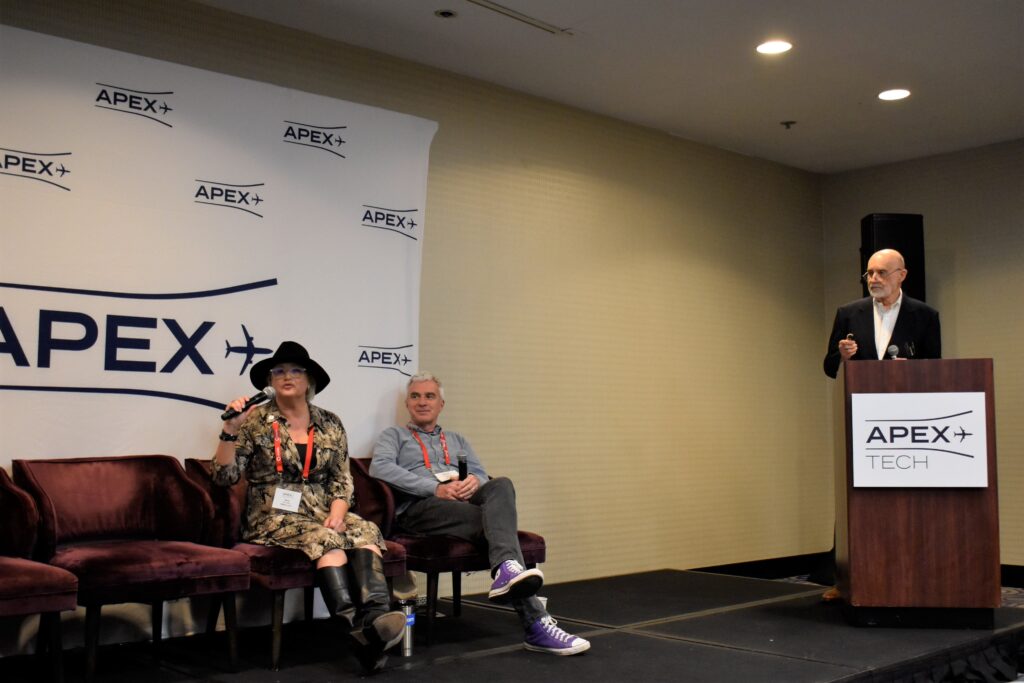APEX TECH: Spafax’s Andy Beer continues “smart” metadata discussion with panel on Language Metadata Tables (LMT)
Share
APEX TECH 2023: Continuing the afternoon’s focus on “smart” metadata, the final session of the final day was a lively one-on-one chat between veteran APEX TECH committee member, Andy Beer, VP Technology, Spafax and longtime media tech and data strategist, Nona Janssen Walls, MBA, Sr. Principal, Slalom.
After a brief introduction by Chief Consultant, Content and Media Strategy, Lufthansa Systems, Michael Childers, Beer and Walls hit the ground running in a session entitled: “Smart” Metadata: Language Metadata Tables (LMT).

Beer started off by pointing out that at present, content providers, content service providers (CSPs), and content integrators do not share consistent definitions of dubbed/subtitled/GUI language variants. This leads to media sourcing delays, rack test rejections, and a poor overall user experience.
That’s where the Language Metadata Table (LMT) comes into play.
LMT provides a path forward with a comprehensive set of language tags, explained Beer, whose hope is that, ideally, the industry would switch from legacy ISO 639 tags to the LMT (IETF BCP 47 subset). Alternatively, the LMT tags could be leveraged as a static pivot dictionary to map third party tags to each other, reducing ambiguity.
Beer and Walls went on to outline the inner workings of the LMT with a breezy, easy-to-follow presentation and discussion that was, judging from the enthusiastic response from the attendees, truly something to talk about.
“LMT began in 2017 at HBO/Warner media, as it was then called,” said Walls. “It was born out of a need to standardize language across the Warner Media and Warner Bros landscape. Once the founder, Yonah Levenson, realized the value that the LMT had, she expanded it to include other studios, including Disney and Comcast. In time, Levenson included other industry partners and participants like Slalom Consulting to make sure that there were different views around the LMT and that we consider all the different use cases, so that it’s a more holistic solution that people can really use and embrace without having to worry about what’s not in there.”
Explaining the process of how the data is input, Beer said getting the languages right is key.
“As you know, the cultural impact of getting the languages right is very important for an airline. I’m not sure I’d say it’s the most critical piece of metadata but it’s among the most critical pieces of metadata that’s going to help automate thinking without there being big blunders and disappointments on the GUI,” said Beer.
Citing as an example, a passenger who speaks the language not being able to determine which button to press on the GUI, or pressing the button and getting the wrong language (or no language at all) Beer repeated: “Getting this right is critical. Using the LMT is really a no brainer.”
Another important aspect of the LMT, added Walls, is how many languages it encompasses.
“What we’ve tried to do with the LMT, specifically around entertainment, is narrow it down to the languages that people are actually using. We’ve only managed to narrow it down to about 300 and it’s growing,” said Walls, adding that, at its inception, the LMT had 128 languages.
And while the original 128 languages were those that were generally considered to be the most common in entertainment – English, Spanish, French, etc. – Walls says the languages that are being added now are much more diverse, which makes the LMT even more inclusive and valuable in today’s increasingly globalized market.
“Doing some research the other day I found out that only 6% of the world speaks English as a first language,” noted Walls. “So we know that the world is going that way. And as we become more sensitive to non-English speakers, it’s just a given that we are going to need to satisfy audiences/passengers, both from a content and an ad perspective, in multiple languages.”
Encouraging attendees to reach out to himself and Walls anytime for more information on the LMT, Beer then handed it back to Childers who thanked everyone for another insightful APEX TECH.
“We really appreciate all the work you put in on the working group, Andy, and we very much appreciate you taking the time to come out and help explain all of this to us today as well, Nona,” said Childers.
“The LMT is an outstanding tool and I think we need to adopt it right away as it will speed up the supply chain and significantly reduce the number of file delivery errors. So, great work. And thank you so much to the both of you.”


